- Home
- Wendell Berry
New Collected Poems Page 7
New Collected Poems Read online
Page 7
he dreamed of the spring woodsflowers
standing in the ground,
dark yet under the leaves and under
the bare cold branches.
But in his dream he knew their way
was prepared, and in their time
they would rise up joyful.
And though he had dreamed earlier
of strife, his sleep became peaceful.
He said: If we, who have killed
our brothers and hated ourselves,
are made in the image of God,
then surely the bloodroot,
wild phlox, trillium and mayapple
are more truly made
in God’s image, for they have desired
to be no more than they are,
and they have spared each other.
Their future
is undiminished by their past.
Let me, he said in his dream,
become always less a soldier
and more a man,
for what is unopened in the ground
is pledged to peace.
When he woke and went out
a flock of wild ducks that had fed
on the river while he slept
flew off in fear of him.
And he walked, manly, into the new day.
He came to his window
where he sat and looked out,
the earth before him, blessed
by his dream of peace,
bad history behind him.
21.
He has known a tunnel
through the falling snow
that brought him back at dark
and nearly killed him on the way,
the road white as the sky
and the snow piling.
Mortality crept up close
in the darkness round his eyes.
He felt his death’s wrenched avatars
lying like silent animals
along the ditch. He thought
of his wife, his supper and his bed,
and kept on, and made it.
Now he sits at the window
again, the country hard and bright
in this winter’s coldest morning.
The river, unfrozen still,
gives off a breath of smoke
that flows upstream with the wind.
Behind him that burrow
along the wild road
grows certain in his mind,
leading here, surely. It has arrived
at the window, and is clarified.
Now he has learned another way
he can come here. Luck
taught him, and desire.
The snow lies under the woods
and February is ending.
Far off, another way, he hears
the flute of spring,
an old-style traveler,
wandering through the trees.
22.
Still sleeping, he heard
the phoebe call, and woke to it,
and winter passed out of his mind.
The bird, in the high branches
above the road-culvert mouth,
sang to what was sleeping,
two notes, clear and
harsh. The stream came,
full-voiced, down the rocks
out of the woods. The wood ducks
have come back to nest
in the old hollow sycamore.
The window has changed, no longer
remembering, but waiting.
23.
He stood on the ground
and saw his wife borne away
in the air, and suddenly
knew her. It is not the sky
he trusts her to, or her flight,
but to herself as he saw her
turn back and smile. And he
turned back to the buried garden
where the spring flood rose.
The window is made strange
by these days he has come to.
She is the comfort of the rooms
she leaves behind her.
24.
His love returns
and walks among the trees,
a new time lying beneath
the leaves at her feet.
There are songs in the ground
audible to her. She enters
the dark globe of sleep,
waking the tree frogs
whose songs star the silence
in constellations. She wakens
the birds of mornings. The sun
makes a low gentle piping.
The bloodroot rises in its folded
leaf, and there is a tensing
in the woods. There is
no window where she is.
All is clear where the light begins
to dress the branch in green.
25.
The bloodroot is white
in the woods, and men renew
their abuse of the world
and each other. Abroad
we burn and maim
in the name of principles
we no longer recognize in acts.
At home our flayed land
flows endlessly
to burial in the sea.
When mortality is not heavy
on us, humanity is—
public meaninglessness
preying on private meaning.
As the weather warms, the driven
swarm into the river,
pursued by whining engines,
missing the world
as they pass over it,
every man
his own mosquito.
26.
In the heron’s eye
is one of the dies of change.
Another
is in the sun.
Each thing is carried
beyond itself.
The man of the window
lives at the edge,
knowing the approach
of what must be, joy
and dread.
Now the old sycamore
yields at its crown
a dead branch.
It will sink like evening
into its standing place.
The young trees rise,
and the dew is on them,
and the heat of the day
is on them, and the dark
—end and beginning
without end.
27.
Now that April with sweet rain
has come to Port William again,
Burley Coulter rows out
on the river to fish.
He sits all day in his boat,
tied to a willow, his hat
among green branches,
his dark line curving
in the wind. He is one
with the sun.
The current’s horses graze
in the shade along the banks.
The watcher leaves his window
and goes out.
He sits in the woods, watched
by more than he sees.
What is his is
past. He has come
to a rootless place
and a windowless.
There is a wild light
his mind loses
until the spring renews,
but it holds his mind
and will not let it rest.
The window is a fragment
of the world suspended
in the world, the known
adrift in mystery.
And now the green
rises. The window has an edge
that is celestial,
where the eyes are surpassed.
TO A SIBERIAN WOODSMAN
(after looking at some pictures in a magazine)
1.
You lean at ease in your warm house at night after supper,
listening to your daughter play the accordion. You smile
with the pleasure of a man confi
dent in his hands, resting
after a day of long labor in the forest, the cry of the saw
in your head, and the vision of coming home to rest.
Your daughter’s face is clear in the joy of hearing
her own music. Her fingers live on the keys
like people familiar with the land they were born in.
You sit at the dinner table late into the night with your son,
tying the bright flies that will lead you along the forest streams.
Over you, as your hands work, is the dream of the still pools.
Over you is the dream
of your silence while the east brightens, birds waking close by
you in the trees.
2.
I have thought of you stepping out of your doorway at dawn,
your son in your tracks.
You go in under the overarching green branches of the forest
whose ways, strange to me, are well known to you as the sound
of your own voice
or the silence that lies around you now that you have ceased to
speak,
and soon the voice of the stream rises ahead of you, and you
take the path beside it.
I have thought of the sun breaking pale through the mists over
you
as you come to the pool where you will fish, and of the mist
drifting
over the water, and of the cast fly resting light on the face of the
pool.
3.
And I am here in Kentucky in the place I have made myself
in the world. I sit on my porch above the river that flows muddy
and slow along the feet of the trees. I hear the voices of the wren
and the yellow-throated warbler whose songs pass near the
windows
and over the roof. In my house my daughter learns the
womanhood
of her mother. My son is at play, pretending to be
the man he believes I am. I am the outbreathing of this ground.
My words are its words as the wren’s song is its song.
4.
Who has invented our enmity? Who has prescribed us
hatred of each other? Who has armed us against each other
with the death of the world? Who has appointed me such anger
that I should desire the burning of your house or the
destruction of your children?
Who has appointed such anger to you? Who has set loose the
thought
that we should oppose each other with the ruin of forests and
rivers, and the silence of birds?
Who has said to us that the voices of my land shall be strange
to you, and the voices of your land strange to me?
Who has imagined that I would destroy myself in order to
destroy you,
or that I could improve myself by destroying you? Who has
imagined
that your death could be negligible to me now that I have seen
these pictures of your face?
Who has imagined that I would not speak familiarly with you,
or laugh with you, or visit in your house and go to work with
you in the forest?
And now one of the ideas of my place will be that you would
gladly talk and visit and work with me.
5.
I sit in the shade of the trees of the land I was born in.
As they are native I am native, and I hold to this place as
carefully as they hold to it.
I do not see the national flag flying from the staff of the
sycamore,
or any decree of the government written on the leaves of the
walnut,
nor has the elm bowed before the monuments or sworn the oath
of allegiance.
They have not declared to whom they stand in welcome.
6.
In the thought of you I imagine myself free of the weapons and
the official hates that I have borne on my back like a
hump,
and in the thought of myself I imagine you free of weapons and
official hates,
so that if we should meet we would not go by each other
looking at the ground like slaves sullen under their
burdens,
but would stand clear in the gaze of each other.
7.
There is no government so worthy as your son who fishes with
you in silence beside the forest pool.
There is no national glory so comely as your daughter whose
hands have learned a music and go their own way on the keys.
There is no national glory so comely as my daughter who
dances and sings and is the brightness of my house.
There is no government so worthy as my son who laughs, as he
comes up the path from the river in the evening, for joy.
A DISCIPLINE
Turn toward the holocaust, it approaches
on every side, there is no other place
to turn. Dawning in your veins
is the light of the blast
that will print your shadow on stone
in a last antic of despair
to survive you in the dark.
Man has put his history to sleep
in the engine of doom. It flies
over his dreams in the night,
a blazing cocoon. O gaze into the fire
and be consumed with man’s despair,
and be still, and wait. And then see
the world go on with the patient work
of seasons, embroidering birdsong
upon itself as for a wedding, and feel
your heart set out in the morning
like a young traveler, arguing the world
from the kiss of a pretty girl.
It is the time’s discipline to think
of the death of all living, and yet live.
A POEM OF THANKS
I have been spared another day
to come into this night
as though there is a mercy in things
mindful of me. Love, cast all
thought aside. I cast aside
all thought. Our bodies enter
their brief precedence,
surrounded by their sleep.
Through you I rise, and you
through me, into the joy
we make, but may not keep.
ENVOY
Love, all day there has been at the edge of my mind
the wish that my life would hurry on,
my days pass quickly and be done,
for I felt myself a man carrying a loose tottering bundle
along a narrow scaffold: if I could carry it
fast enough, I could hold it together to the end.
Now, leaving my perplexity and haste,
I come within the boundaries of your life, an interior
clear and calm. You could not admit me burdened.
I approach you clean as a child of all that has been with me.
You speak to me in the dark tongue of my joy
that you do not know. In you I know
the deep leisure of the filling moon. May I live long.
FARMING: A HAND BOOK
(1970)
For Owen and Loyce Flood
THE MAN BORN TO FARMING
The grower of trees, the gardener, the man born to farming,
whose hands reach into the ground and sprout,
to him the soil is a divine drug. He enters into death
yearly, and comes back rejoicing. He has seen the light lie down
in the dung heap, and rise again in the corn.
His thought passes along the row ends like a mole.
What miraculous seed has he swallowed
that the unending sentence of his love flows out of his mo
uth
like a vine clinging in the sunlight, and like water
descending in the dark?
THE STONES
I owned a slope full of stones.
Like buried pianos they lay in the ground,
shards of old sea-ledges, stumbling blocks
where the earth caught and kept them
dark, an old music mute in them
that my head keeps now I have dug them out.
I broke them where they slugged in their dark
cells, and lifted them up in pieces.
As I piled them in the light
I began their music. I heard their old lime
rouse in breath of song that has not left me.
I gave pain and weariness to their bearing out.
What bond have I made with the earth,
having worn myself against it? It is a fatal singing
I have carried with me out of that day.
The stones have given me music
that figures for me their holes in the earth
and their long lying in them dark.
They have taught me the weariness that loves the ground,
and I must prepare a fitting silence.
THE SUPPLANTING
Where the road came, no longer bearing men,
but briars, honeysuckle, buckbush and wild grape,
the house fell to ruin, and only the old wife’s daffodils
rose in spring among the wild vines to be domestic
and to keep the faith, and her peonies drenched the tangle
with white bloom. For a while in the years of its wilderness
a wayfaring drunk slept clinched to the floor there
in the cold nights. And then I came, and set fire
to the remnants of house and shed, and let time
hurry in the flame. I fired it so that all
would burn, and watched the blaze settle on the waste
like a shawl. I knew those old ones departed
then, and I arrived. As the fire fed, I felt rise in me
something that would not bear my name—something that
bears us
through the flame, and is lightened of us, and is glad.
SOWING
In the stilled place that once was a road going down
from the town to the river, and where the lives of marriages grew

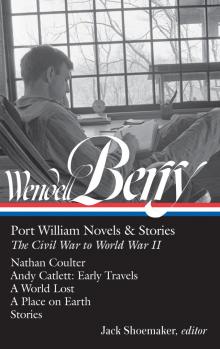 The Selected Poems of Wendell Berry
The Selected Poems of Wendell Berry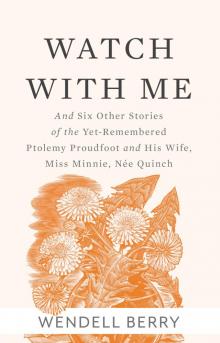 Watch With Me
Watch With Me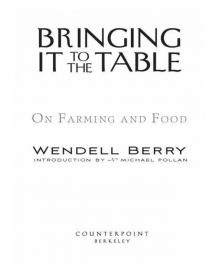 Bringing It to the Table: On Farming and Food
Bringing It to the Table: On Farming and Food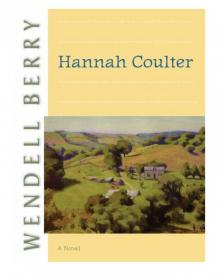 Hannah Coulter
Hannah Coulter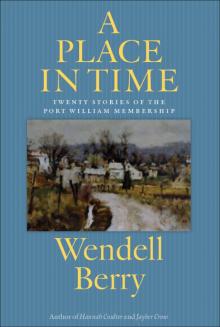 A Place in Time: Twenty Stories of the Port William Membership
A Place in Time: Twenty Stories of the Port William Membership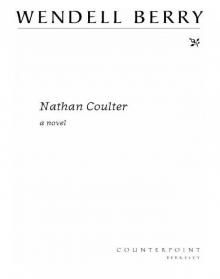 Nathan Coulter
Nathan Coulter Why I Am Not Going to Buy a Computer
Why I Am Not Going to Buy a Computer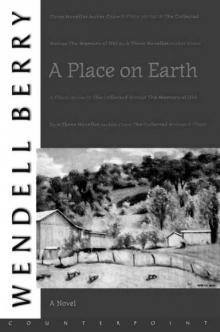 A Place on Earth
A Place on Earth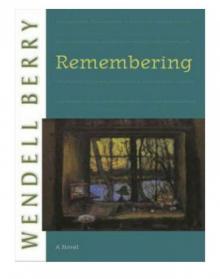 Remembering
Remembering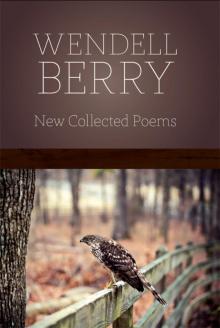 New Collected Poems
New Collected Poems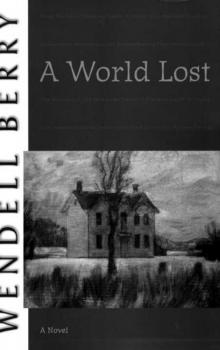 A World Lost
A World Lost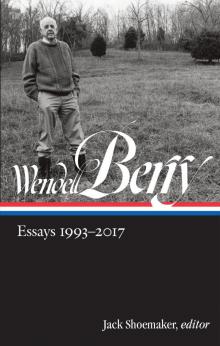 Wendell Berry
Wendell Berry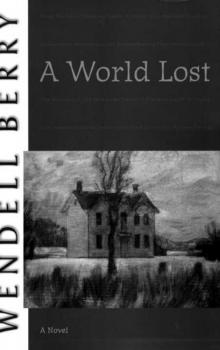 A World Lost: A Novel (Port William)
A World Lost: A Novel (Port William)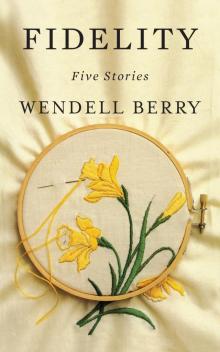 Fidelity
Fidelity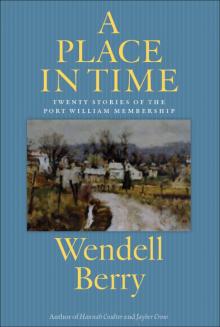 A Place in Time
A Place in Time